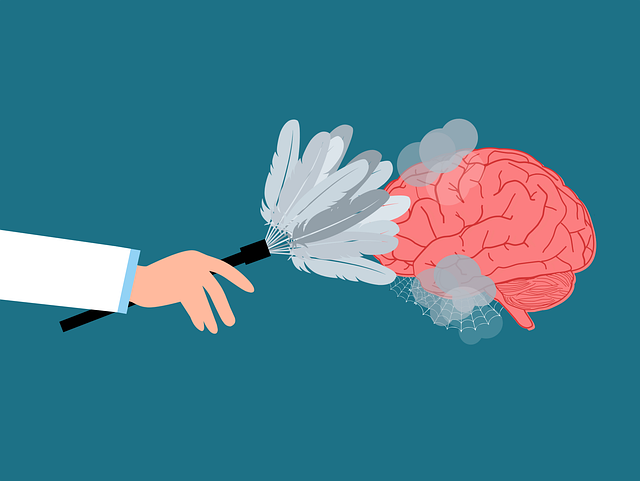Positive thinking exercises, integrated with Cognitive Behavioral Therapy (CBT) and Mind Over Matter principles, are a strategic approach to treating Centennial Oppositional Defiance Disorder (OCD). Self-awareness exercises help individuals recognize and challenge automatic negative responses, leading to reduced anxiety, enhanced well-being, and mental flexibility. Key strategies include reframing techniques in daily routines, fostering openness about mental health, and practicing gratitude and cognitive restructuring. Regular reflection and journaling track progress, while exercise and mindfulness meditation support long-term success in managing OCD challenges.
Positive thinking exercises are transforming the landscape of therapy for conditions like Centennial Oppositional Defiance Disorder (OCD). This article delves into the power of positive reframing as a therapeutic tool, exploring its role in addressing OCD symptoms. We’ll guide you through understanding this concept, implementing effective strategies, and overcoming challenges to sustain positive thinking in OCD management. By the end, you’ll be equipped with valuable insights for enhancing therapy outcomes.
- Understanding Positive Thinking and its Role in Therapy for OCD
- Implementing the Exercise: Strategies for Effective Positive Reframing
- Overcoming Challenges: Tips for Sustaining Positive Thinking in OCD Management
Understanding Positive Thinking and its Role in Therapy for OCD

Positive thinking exercises play a significant role in therapy for conditions like Obsessive-Compulsive Disorder (OCD), challenging the deeply rooted negative thought patterns that contribute to distressing symptoms. OCD, characterized by intrusive thoughts and repetitive behaviors, can be effectively managed using Cognitive Behavioral Therapy (CBT) coupled with positive thinking principles. By applying Mind Over Matter principles, individuals learn to confront and replace negative thoughts with more balanced and realistic perspectives, a process often facilitated through Self-Awareness Exercises.
These exercises encourage individuals to recognize and challenge their automatic negative responses, fostering resilience in the face of obsessive thoughts. As therapy progresses, individuals develop coping strategies that not only reduce anxiety but also enhance overall well-being. Through dedicated practice, they learn to navigate life’s challenges with greater ease, demonstrating improved mental flexibility and emotional stability, even in situations previously triggering intense anxiety or distress.
Implementing the Exercise: Strategies for Effective Positive Reframing

Implementing the positive thinking exercise requires a strategic approach to ensure its effectiveness, especially when addressing conditions like Centennial Oppositional Defiance Disorder (COD). One key strategy is to integrate reframing techniques into daily routines, encouraging individuals to challenge negative thoughts and replace them with more constructive alternatives. This process involves conscious effort and practice, starting with identifying negative patterns. By fostering a culture of openness and honesty around mental health struggles, particularly in diverse communities, practitioners can tailor these exercises to respect and incorporate cultural sensitivity in mental healthcare practice.
Emotional well-being promotion techniques play a vital role in stress management. When implementing positive reframing, it’s crucial to teach individuals specific methods for reframing negative statements into positive affirmations. This might include focusing on personal strengths, practicing gratitude, or employing cognitive restructuring techniques. Encouraging regular reflection and journaling can further enhance these practices, allowing individuals to track their progress and identify patterns of improvement in their emotional well-being over time.
Overcoming Challenges: Tips for Sustaining Positive Thinking in OCD Management

Overcoming challenges is a significant aspect of managing OCD (Centennial Oppositional Defiance Disorder Therapy), and cultivating positive thinking plays a pivotal role in this process. Individuals with OCD often face internal conflicts and negative thought patterns, making it essential to develop strategies for sustaining optimism. One effective tip is to reframe negative thoughts; instead of letting them dominate, challenge these thoughts by seeking evidence that contradicts them. For instance, if an individual constantly worries about disappointing others, they could counter this by recalling past achievements or acts of kindness that were well-received.
Engaging in regular self-care practices, such as exercise and mindfulness meditation, can also aid in burnout prevention while enhancing positive thinking and self-esteem improvement. These activities promote a sense of control and reduce anxiety, allowing individuals to better navigate the challenges of OCD. By incorporating these strategies into their daily routines, those managing OCD can foster a more optimistic mindset, which is crucial for long-term success and overall well-being.
Positive thinking exercises, when integrated into Cognitive Behavioral Therapy for conditions like Centennial Oppositional Defiant Disorder (OCD), offer a powerful tool for managing symptoms and improving overall well-being. By learning effective reframing strategies and staying committed, individuals with OCD can overcome negative thought patterns and foster a more optimistic mindset. With consistent practice, these exercises have the potential to revolutionize therapy outcomes and enhance the quality of life for those affected by OCD.













